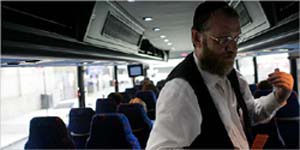 By THOMAS J. LUECK
By THOMAS J. LUECK
Published: September 7, 2006
N.Y.TIMES, New York--The number of competitors to Greyhound Lines with inexpensive fares has soared in recent years, expanding well beyond the no-frills buses based in Chinatown in Manhattan and setting off fierce battles for riders. In fact, in the booming world of discount travel, there is apparently no room for two Hasidic-owned companies on the same route.
A dispute between the two bus companies that are vying for riders from New York to Washington, Vamoose and Washington Deluxe, has landed in court. As a result, some customers have been confused in recent days by Vamoose�s Web site, which first said the company was temporarily out of business, then said it was running again, but with fewer stops.
The Vamoose-Washington Deluxe dispute, in which Washington Deluxe says that Vamoose trespassed on its route, is a small scuffle in a more tumultuous struggle that has transformed travel in the Northeast. Involved are more than 30 discount lines that pick up people curbside.
The lines, whose fares are much lower than the cost of air or train tickets and have led to discounts by Greyhound, the nation�s largest carrier, have won over thousands of devoted customers. But the industry�s short history also includes accidents, regular breakdowns, lawsuits and even violence.
The discount bus lines began springing up in Chinatown in the late 1990�s with a handful of operators picking up passengers on haphazard schedules. The new lines had an advantage over more established bus companies because they did not pay for space or employees at the Port Authority Bus Terminal or other bus stations.
What began in Chinatown has blossomed into a major segment of the region�s transportation industry. The curbside operators now connect Manhattan and Brooklyn to Boston, Washington, Philadelphia, Atlantic City and more than a dozen other destinations.
The industry�s customer base has also expanded to include students, tourists and retirees. The Chinatown companies� curbside stops have extended north to Midtown Manhattan from Chinatown.
Vamoose and Washington Deluxe are owned by competing Hasidic entrepreneurs from Williamsburg, Brooklyn. Washington Deluxe, which predates Vamoose by two years, obtained a settlement from a rabbinical court in 2004 prohibiting Vamoose from operating on the same New York-to-Washington routes.
The religious court�s ruling was upheld in June by Justice Lawrence S. Knipel of State Supreme Court in Brooklyn. Andrew Citron, a lawyer for Washington Deluxe, said he served Vamoose with legal papers resulting from the justice�s ruling in mid-August, leading to the company�s recent temporary shutdown.
The service disruption led to �scores of e-mails from customers who were extremely distressed,� said Florence Bluzenstein, the wife of Vamoose�s owner, Sam Bluzenstein. She said that the legal dispute with Washington Deluxe remains unresolved, but that Vamoose has satisfied the court rulings by discontinuing service inside Washington.
Mr. Citron said Washington Deluxe believes that Vamoose is still violating the court�s order by offering service anywhere in the Washington metropolitan area.
Whatever the legal outcome, the dispute pales in scope and ferocity to past battles in the curbside-pickup bus industry. In 2003, a struggle for control of a Chinatown bus line led one employee to fatally stab another, the police said.
The following year, the authorities were investigating links between the infiltration of Asian organized crime into the growing industry and as many as three murders.
Several serious highway accidents have drawn the scrutiny of members of Congress and state regulators. In August 2005, a bus operated by Fung Wah Bus Transportation, one of the original Chinatown lines, caught fire only moments after its driver pulled off Interstate 91 in Meriden, Conn., forcing 45 passengers to flee.
On Aug. 15 of this year, a bus operated by the Shun Fa line crashed on its route to Pittsburgh from New York and five passengers required hospital treatment. On Tuesday, a discount bus operated by Fung Wah heading to Boston from Chinatown tipped over on a Massachusetts highway, injuring 34 people. The driver was cited for speeding. Companies that cross state lines are regulated by the Federal Motor Carrier Safety Administration. Drivers must have commercial licenses and buses must pass a federal inspection at least once a year.
But critics say newcomers to the industry may be bending the rules.
�Because these companies are new and scraping for every dollar, there is always a temptation to cut corners,� Senator Charles E. Schumer of New York said in an interview.
At his request, Mr. Schumer said, the Justice Department is investigating violations by curbside bus operators.
Federal investigators are believed to be focusing on 8 to 12 of the companies and their compliance with the Americans With Disabilities Act, which requires bus lines to provide access to people in wheelchairs.
�Our concern is not that these small companies are springing up willy-nilly, but that they don�t abide by the rules,� said Peter J. Pantuso, president of the American Bus Association, a trade group that represents Greyhound and other more established bus lines.
Mr. Pantuso said that many of the curbside operators were in violation of the rules for disabled riders and may not carry adequate insurance or provide sufficient driver training.
But people in the discount bus industry said conditions have improved and that they are being criticized mainly by larger bus lines that are suddenly under pressure to reduce fares.
Greyhound, for one, has done so for people who buy tickets on the Internet.
Greyhound�s discounts include one-way fares of $20 from New York to Boston, and $23 from New York to Washington. That compares with fares of $30 to Boston and $37 to Washington for those who pay in person on the same day that they travel.
A recent search on GotoBus.com(
http://www.gotobus.com/), an online bus-ticket service, provided dozens of options for people traveling from New York to more than 20 cities. Its best prices, all on curbside pickup lines, included a $20 fare to Washington, a $15 fare to Boston and a $12 fare to Philadelphia.
|